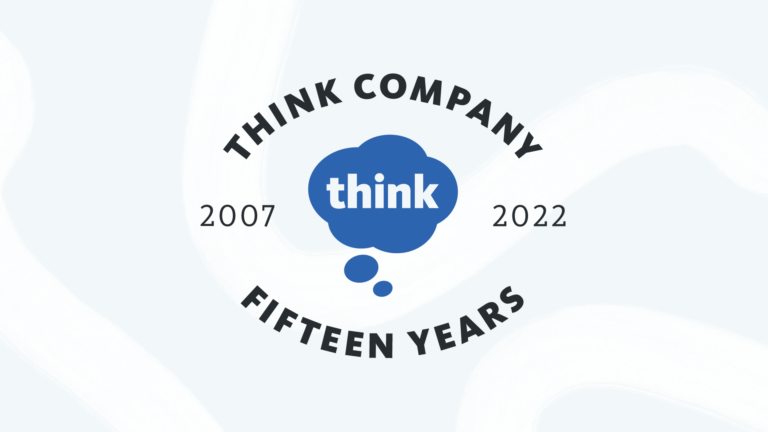Our most-loved UX and technology content of 2023

Here we are—2023 is coming to a close, and we can’t believe it. We’re taking a moment to reflect on the insights that were most popular in our community this year.
So, just like last year (and the year before), we pulled together our top 10 most-loved blog posts spanning design, technology, research, content strategy, and much more. We hope you enjoy these insights and strategies from the Think team.
Top 10 user experience and technology blog posts from Think Company
10. Deliver a seamless omnichannel pharma experience with content strategy
Pharmaceutical companies face unique content strategy challenges. An omnichannel content strategy can help to effectively connect multiple brands, websites, tools, and digital platforms to drive real value for users—all in one unified experience. In this most-loved blog post, our experts share insights from their experiences helping pharma companies navigate and improve their digital experiences to ensure they’re meeting HCPs’ in-the-moment needs.
9. Burn the velvet curtain: Why torching big website launches is better business
It’s a common trap: thinking about your enterprise website as a legacy behemoth that should get a new coat of paint every few years. You release it with a lot of fanfare: the red velvet curtain parts, confetti falls from the ceiling, and everyone goes home happy—for a little while. But as time passes, your teams see new needs arise, things get stale, and you’re back where you were before. Our team shares how to avoid that problematic big website launch cycle by embracing the power of iterative design and development.
8. What you need to know about AI and how it can boost your team’s work now
It’s on everyone’s mind: AI is transforming the business landscape. But we’re still learning a lot about AI and its potential for design and technology leaders. It’s uncharted territory, and we’re all learning together. However, our team has found practical applications in product development, team planning, operations, and more. Check out the blog post to learn how we’re leveraging AI to boost team productivity.
7. Market research isn’t enough; Understand your customers with UX research
Market and UX research are often confused as one and the same, but there are major differences between the two. Market research focuses on the customer’s opinions, while UX research focuses on the user’s actions. Our experts share more about the differences, how they can complement each other, and why UX research is vital to your digital products.
6. How to think like a product team (even if you aren’t one)
Often, teams don’t consider their digital applications or software “products” because they might not be sold to customers. But you’re likely selling yourself and your tools short. Whether the solution is client-facing or used internally by your employees, it should be treated like a product to ensure continued improvement. Check out this most-loved blog post to learn how your team can think like a product team.
5. Signs you need a UX writer
When designing an app or product interface, good UX writing can help users make sense of interactions and processes. Without a dedicated UX writer, content design debt can accumulate, and the product’s usability can erode. Check out this blog post to learn more about how UX writing can impact your ROI.
4. Why healthcare leaders can’t afford to ignore digital accessibility
Digital accessibility is not just a compliance issue; it’s a good business decision. Healthcare organizations that invest in digital accessibility improve their patient satisfaction, loyalty, and bottom line. In this most-loved blog post, we share why a holistic approach to digital accessibility is vital for a healthcare organization’s success.
3. Supporting content operations for a new portal launch using Airtable
We’re big Airtable fans (and service partners) here at Think Company! And we know content operations can be complicated in regulated industries, especially with the need for multiple regulatory reviews. Insert Airtable—a content operations tool to manage content changes and streamline the migration of content for a leading pharmaceutical organization’s customer portal. In this blog post, we share how we’ve helped clients utilize Airtable for content operations.
2. Four Digital transformation principles that improve patient trust and service
Navigating the patient journey in today’s healthcare landscape can be complex, especially with telehealth and portal communications on the rise. Outdated, siloed digital tools create a disjointed experience and can cause patient distrust. Successful patient care relies on having strong digital tools that can support the patient journey. In our blog post, we share key principles that are revolutionizing patient care through digital transformation.
1. Improve your enterprise product process with product-oriented delivery (POD)
Our most loved topic of the year, the Product-Oriented Delivery model can empower your teams to make informed decisions that will drive value to users and your business. Utilizing the POD model allows for predictable team utilization, flexible capacity of specialized teams, and accelerated product launches. Check out this year’s most loved blog post and learn more about the benefits of PODs from our team of experts.
More UX and technology insights to come in 2024
At Think Company, we create world-class digital experiences with every user in mind. Our talented team of Thinkers has deep expertise across complex and regulated industries in design, technology, research, content strategy, and much more—and our insights share voices from across the company with diverse experiences. We’re looking forward to another year of sharing our expertise on the most complex digital challenges leaders are facing today.
Read something that could be helpful for your product team? Let’s chat!













